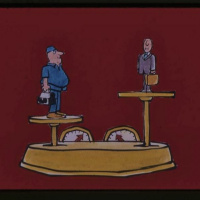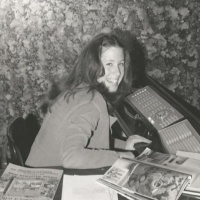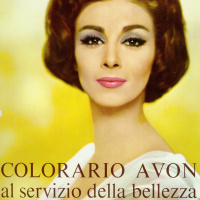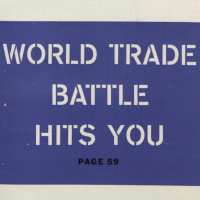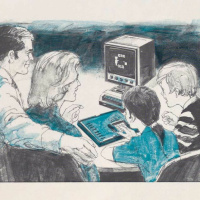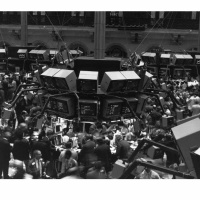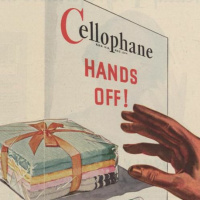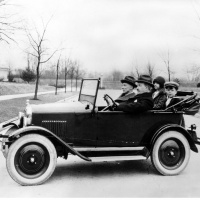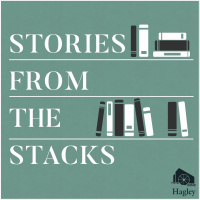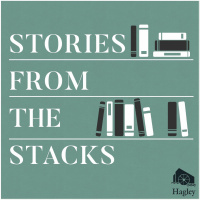Stories From The Stacks
- Author: Vários
- Narrator: Vários
- Publisher: Podcast
- Duration: 79:48:23
- More information
Informações:
Synopsis
Podcast by Hagley Museum and Library
Episodes
-
Broadcasting Consensus: Radio & Free Enterprise with Taylor Currie
26/02/2020 Duration: 14minAmerican educators in 1940s classrooms eagerly played corporate propaganda for their students. The source, Dupont’s Cavalcade of America, was a mid-twentieth century radio program designed to promote the values of free enterprise, productivity, & consumerism to the public through the medium of historical drama. Teachers introduced the program to classrooms to supplement lessons in the American past, and its fair historical accuracy made it potentially useful as a teaching tool. However, the program came with a heavy dose of messaging meant to promote a “liberal consensus” of corporate and government unity and competency in the face of social and political challenges. In this episode of Stories from the Stacks, Taylor Currie, graduate student at Queen’s University, discusses how she approached her project, how she discovered her source base at Hagley, and how she interprets the material to suit her research agenda. Attempting to trace the long history of what she terms the “project of liberal consensus,” C
-
Şerefe: The Culture & Regulation of Alcohol in Turkey with Kyle Evered
11/02/2020 Duration: 37minAttitudes toward intoxication can be unstable. The government of Turkey, for example, within a single generation went from producing alcohol and promoting its consumption as civil and modern, to restricting the consumption of alcohol and prohibiting its advertisement, right down to cellphone ringtones that sound like beer bottles opening. A culture once known for its Bektashi Sufis and Janissary soldiers, both famous for enjoying alcohol, now faces increasing pressure to dry out. This remarkable turnaround is indicative of the ways in which societies regulate alcohol by cultural norms and legal statues that are all subject to change. In this episode of Stories from the Stacks, historical geographer Kyle Evered, associate professor at Michigan State University, discusses the culture and regulation of alcohol in Turkey, from the late Ottoman Empire through the early Republican period and up to the present day. Religion, ethnic & sectarian identity, and political ideals all played a role in shaping attitud
-
Selling Irish: How the American Market Shaped the Image of a Nation with Marion Casey
10/12/2019 Duration: 17minLeprechauns have hocked Irish goods to American consumers for generations. When one of the wee folk appeared on a bottle of Irish whisky, its familiar associations marked the drink as an authentic product of an antique culture for the American consumer. From the Blarney Stone to the shamrock, symbols laden with Irish associations in the American mind have proved useful marketing tools for businesses that sought to leverage the value of the word “Irish” in the American marketplace. In this episode of Stories from the Stacks, historian of the Irish-American experience Marion Casey, professor at the Glucksman Ireland House at New York University, discusses the commercial use of Irish culture to sell goods to American consumers. The Irish people possessed an idea of Ireland and its identity that different from that held in the popular American mind. This forced Irish-American businesses to leverage popular preconceptions of Ireland as quaint, natural, and antique, even as they sought to reorient the Irish econo
-
Programming Health: Early Bio-Medical Engineering & Computer Diagnosis with Andrew Lea
26/11/2019 Duration: 27minIn the 1950s, Vladimir K. Zworykin, an engineer recently retired from research at RCA, looked at the rising cost of health care and the shortage of medical personnel in America, and decided to do something about it. His solution was to apply computer engineering techniques to the problems of health care and medical diagnosis. To do so, Zworykin established an interdisciplinary research group of engineers, statisticians, and physicians, and tasked them with developing computer programs capable of aiding medical diagnosis. In this episode of Stories from the Stacks, Andrew Lea, PhD candidate in the history of science and medicine at the University of Oxford, discusses the work of Zworykin and company, tracing the origins of the push for bio-medical computing, its uneven reception in the medical world, and the unfolding legacy the movement has left. The Zworykin project focused on hematology, and worked on diagnostic software to assist the identification of blood diseases. Translating a vast and incomplete bod
-
Father & Sons: How the du Pont Family Went into Business, with Roma Beaufret
12/11/2019 Duration: 12minComing to America to start a new life is filled with challenges, even for the wealthy and well-connected. When the du Pont family crossed the Atlantic, they sought a new beginning in a land of opportunity. Burdened by sibling rivalries and divergent ideas about how best to make their fortune, the family compensated with dedication to one another and a boatload of capital invested by social and economic elites in France. Once landed, the du Ponts set to work figuring out how to remake themselves into Americans, and how to return a profit. In this episode of Stories from the Stacks, Roma Beaufret, master’s student at L'École Normale Supérieure de Lyon, discusses the early history of the du Pont family’s business ventures. With a focus on the relationship between business practice and family intimacy, Beaufret seeks to understand the ways the du Ponts brought new ideals of economic and scientific rationality with them to America, and how they worked together to put them into practice. Using Hagley Library c
-
Give & Take: Private Faith & Public Charity in America with Andrew Jungclaus
29/10/2019 Duration: 22minThere are many reasons to give to charity: convictions of religious faith, values of service to others, and plain old greed. Charities can serve the public good, but they can also serve personal interests at the same time. In the twentieth century, some affluent Americans turned to philanthropy with mixed motivations. Faith and values mattered to them, but so too did maintaining control over their fortunes, and burnishing their public images. Giving with one hand allowed them to take with the other. In this episode of Stories from the Stacks, scholar of religion Andrew Jungclaus, PhD candidate at Columbia University, discusses the development of major secular charities in the twentieth-century United States, and the private motivations that drove their wealthy and powerful founders to build philanthropic institutions. Jungclaus suggests that before the 1930s, American philanthropy had a small-scale, church-based orientation, and that the “secular behemoths” of modern American charity, including the Pew Cha
-
Money Illusion: Monetary Values & Social Relations with Sebastian Teupe
15/10/2019 Duration: 25minHow much is a dollar worth? It depends who you ask, when, and where. Economic psychologists have a concept called ‘money illusion,’ which suggests that people are not actually very good at judging the value of money in the context of changing monetary conditions. Distinguishing between the perceived value of money and its “objective” market value introduces a new variable to analyses of debates over prices, wages, and social relations. In this episode of Stories from the Stacks, economic historian Sebastian Teupe, junior professor at the University of Bayreuth, discusses the role of money illusion in wage arbitration in Germany, Britain, and the United States from the 1870s to the 1920s. The time range embraces a long deflationary period followed by an inflationary period of equal duration. According to classical economics, wages should have fallen in the first period and risen in the second. Outcomes in the labor market, however, proved to be more complicated, due to factors including money illusion and t
-
We Think You're Important: Big Business & the Women's Movement with Emily Twarog
01/10/2019 Duration: 24minAmericans value equality, but have competing visions of what it should look like. The twentieth-century women’s movement was riven by class divisions. Elite women within the movement favored the uncompromising Equal Rights Amendment; while working women feared that it would undermine gains they had made in gendered workplace protections, and so favored the Women’s Status Bill, which would preserve regulation against exploitation of women workers. This division opened the possibility of business interests appealing to and splitting off a segment of organized American women. In this episode of Stories from the Stacks, labor historian Emily Twarog, associate professor in the School of Labor & Employment Relations at the University of Illinois at Urbana-Champaign, discusses how business interests appealed to the women’s movement with explicit validation of women’s socio-economic importance, and calls to rally women to the cause of free enterprise and the defense of the American way of life. Using Hagley Libra
-
Downstream Impact: Building the Canadian Tar Sands Industry with Hereward Longley
17/09/2019 Duration: 23minThe Athabasca country of Alberta once boasted the world’s premier fur hunting grounds. When the energy crises of the late twentieth century put a premium on the region’s tar sand deposits, rich in hydrocarbons useful for synthesizing oil, corporations built an industrial landscape of extraction and processing infrastructure that displaced former occupation and use of the land. The local environment, and the world economy would never be the same. In this episode of Stories from the Stacks, environmental historian Hereward Longley, PhD candidate at the University of Alberta, discusses the process by which people transformed the environment of northeast Alberta into one of energy resource extraction, and the impact this has had on indigenous communities, Canadian workers, and international energy markets. Using Hagley Library collections, including the J. Howard Pew papers, Sun Oil Company records, and more, Longley discovered that the motivations for building the Canadian tar sands industry varied over ti
-
Beauty Sold Everywhere: The Early Globalization of Avon with Emanuela Scarpellini
03/09/2019 Duration: 23minForget Hollywood superstars. In the 1960s, women around the world wanted a sense of normality when they consumed cosmetics. As the Avon company attempted to win consumers for its mass-produced goods in Latin America and Europe, it adapted its marketing materials to reflect the segmentation of local and changing global ideals of beauty. In this episode of Stories from the Stacks, historian Emanuela Scarpellini, professor at the University of Milan, discusses how Avon planned its expansion overseas from the United States, and adapted to the context of a global marketplace. Monochromatic American ideals of beauty did not necessarily match those of other cultures, yet American goods enjoyed global cachet that added to their perceived value. Easing the tension between these push and pull factors were the Avon ladies, the sales agents that the company relied upon to retail its products, and to communicate with and cultivate consumers. Using Hagley Library collections, including Avon Products, Inc., and the Ern
-
People Would Fake Being Everything: American Impostors with Clifton Hood
20/08/2019 Duration: 25minIn the wide-open American economy, some people fake it ‘til they make it. Historically, American impostors realized the promise of social mobility. Identifying freely with different ethnic, racial, class, gender, or professional groups allowed some Americans to challenge social norms, and to reinvent themselves in an environment of rapid and disorienting change. In this episode of Stories from the Stacks, historian Clifton Hood, professor at Hobart & William Smith Colleges, discusses the macro-history of the American impostor as a social phenomenon. Hood situates his project in the context of his life’s work, suggesting that it may be a way of accessing subaltern perspectives on social hierarchies by locating and interrogating their attempted transgressions of its strictures. Using Hagley Library collections, including Empire Steel & Iron, Reading Company, Pennsylvania Railroad, Penn Virginia Corporation, and Brandywine Oral Histories, Hood discovered that business and government elites tried a variety of
-
The Diplomatic Value of Trade: America's Commercial Cold War with Ryan Haddad
06/08/2019 Duration: 25minTrade wars are nothing new, and the weapons used to fight them sometimes backfire. During the Cold War, the United States took a carrot-and-stick approach to managing foreign relations through trade. The results were decidedly mixed. In this episode of Stories from the Stacks, Ryan Haddad, PhD candidate at the University of Maryland, discusses the use of trade controls by the United States government to pursue foreign policy goals during the Cold War. Using Hagley Library collections, including the records of the National Foreign Trade Council and the National Association of Manufacturers, Haddad discovered how Cold War policies designed to promote free trade in the West, and to isolate the Communist bloc, forced American firms to navigate uncertain diplomatic conditions while trying to maintain market share and profitability. Haddad received an Exploratory Grant from the library’s Center for the History of Business, Technology, & Society to support his use of Hagley Library collections. More informatio
-
It's Okay to Have Fun with Computers: Video Game Culture with Elizabeth Badger
23/07/2019 Duration: 24minIs it okay to have fun with computers? Joseph Weisbecker, an electrical engineer from the twentieth century, gives an unequivocal yes! During his long career, Weisbecker made it his mission to promote the use of computers for human purposes beyond business and military applications. For him, there was no shame in video games, and he wanted the world to agree. On this episode of Stories from the Stacks, Elizabeth Badger, PhD candidate at the University of Minnesota – Twin Cities, discusses the early history of video game culture, focusing on the effects of the commodification of games. Badger suggests that gaming culture initially focused on collective effort and community ethos, and that a turning point in the 1980s lead to the re-conception of video games as consumer commodities controlled by corporate interests. Badger situates her project in the context of her own experience with gaming and video game culture, noting the widespread prejudice against video games, and the sexism within gaming culture. Us
-
Building for Infinite Participation: High-Speed Trading in New York & Chicago with Aaron Shkuda
09/07/2019 Duration: 25minIn 1968, the New York Stock Exchange drowned in a sea of paperwork, which forced it to close to trading for one day every week. Something had to be done to allow the finite space of the trading floor to serve the potentially infinite growth in trade volume. The automation of securities trading, the replacement of open outcry pits and paperwork with electronic infrastructure, gained momentum as exchanges competed to be bigger, faster, and more secure than rivals. In this episode of Stories from the Stacks, urban historian Aaron Shkuda, project manager of the Princeton-Mellon Initiative in Architecture, Urbanism, & the Humanities, discusses his research into the ways securities exchanges in New York and Chicago met the spatial challenges of their mid-twentieth century growth. Shkuda focuses on the relationship between exchange, back office functions, and the urban fabric in which they are embedded, which drew numerous stakeholders into the discussion of market expansion and automation. Using Hagley Library
-
There's a Huge Corporate Asset Here: Brands & Trademark Law with Oren Bracha
25/06/2019 Duration: 25minPrint and sell posters with the Coke-a-Cola logo on them and prepare to get sued. For corporations today, brands are valued property to be aggressively defended from unauthorized use. This was not always the case. The proprietary attitude taken by companies toward their brands developed in the context of a growing consumer economy, and under the tutelage of lawyers. In this episode of Stories from the Stacks, legal scholar Oren Bracha, professor at the University of Texas at Austin, discusses his research into the legal history of branding and trademarks. Bracha observes that the function of brands in influencing consumer behavior had been recognized by marketers by the turn of the twentieth century, and that the function of brands as corporate property developed subsequently as a result of the intersection of business practice with the legal profession. Using Hagley Library collections, including the Seagram and DuPont company records, Bracha discovered how the proprietary attitude toward brands translate
-
Nobody Rationalizes Billy: The Early Automotive Industry with Bernie Carlson
11/06/2019 Duration: 24minEverybody knows Henry Ford, then there’s the tycoon you’ve never heard of, Billy Durant. The motive force behind the early success of Buick and the founding of Chevrolet and General Motors, William C. Durant developed business practices that transformed the automobile industry. Durant was a businessman of marked tenacity and impatient of restraint, and he used these qualities to amass a fortune and to fend off would-be interlopers in his arena of corporate power. In this episode of Stories from the Stacks, historian Bernie Carlson, professor at the University of Virginia, discusses his research into the role played by William Durant in the early automobile industry. Carlson suggests that the prominence of Henry Ford and Louis Chevrolet in the historiography of automobiles obscures the diversity of business practice that flourished in the early decades of the industry. Among Durant’s key innovations was the development of the holding company as a corporate form with control over subsidiary firms for manufact
-
THE TVS OF TOMORROW: RCA AND THE INVENTION OF THE FLAT SCREEN TELEVISION with Benjamin Gross
06/02/2019 Duration: 57minTHE TVS OF TOMORROW: RCA AND THE INVENTION OF THE FLAT SCREEN TELEVISION with Benjamin Gross by Hagley Museum and Library
-
An Explosive Time: 1918, A Year in an Explosives Factory
05/09/2018 Duration: 26min1918—it was an explosive time. The nation was at war. Political movements for workers and women's suffrage were gathering steam. The world was on the brink of change. What better place to explore an explosive moment in time than at an explosives factory? In our first episode of this four-part series, we dive into the conflicts and disruptions of the year 1918—from U.S. entry into World War I to the influenza epidemic—and learn how they influenced the lives of the men and women who were making the munitions for the U.S. and its allies at DuPont's Brandywine Works, and the families and communities that depended on them. See more photos, interviews and scripts: https://www.hagley.org/explosive-time
-
Blank Space: The Design Evolution of the Modern Magazine
17/08/2018 Duration: 25minAt the turn of the 20th century, the modern magazine was taking shape, and printers, publishers, illustrators, and advertisers were playing around with new styles and techniques for capturing their readers’ attention. In this episode, Jennifer Greenhill (associate professor of art history at the University of Southern California and author of "Playing it Straight: Art and Humor in the Gilded Age") explores how artists incorporated insights from psychology and advertising into their designs and page layouts. Using blank space, typography, and color, they helped establish a modern aesthetic of magazine illustration and design that was intimately connected to the world of advertising.
-
Lessons from the Early Beginnings of Black Empowerment
02/08/2018 Duration: 34minIn the late 1960s, the civil rights struggle had given way to a more militant black power movement. The Opportunities Industrialization Center (OIC) offered a business-friendly alternative: black empowerment through job training and economic advancement. In this episode, Jessica Levy (postdoctoral research associate at Princeton University's Department of African American Studies) talks with us about how OIC offered vocational and corporate education programs for African Americans in partnership with American companies like Gulf Oil and General Motors. Following their success in America, OIC and American businesses exported these methods to apartheid-era South Africa, arguing that the lessons of desegregation in the United States could apply there too.







